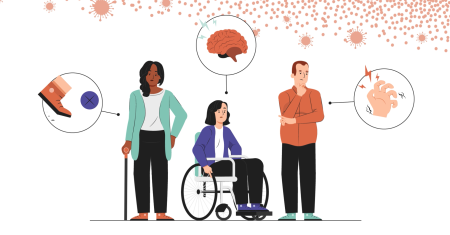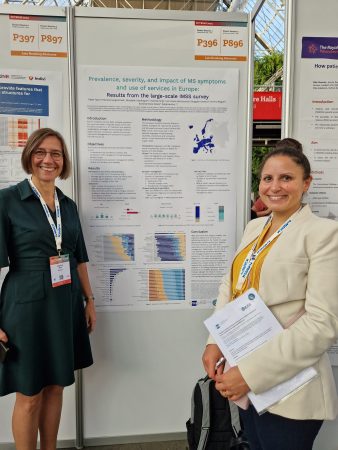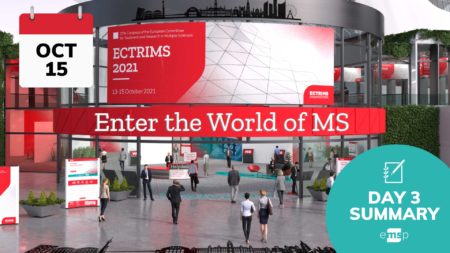
ECTRIMS 2021 – Day 3 Keep us moving – from Patient Perspectives to Rehabilitation
18.10.2021The themes of ECTRIMS Day 3 gave the audience a perspective and a view into the future. Discussed topics included sensors, modern therapy options and rehabilitation apps with the key learning of the day: Exercise can improve progression.
Let’s Move the World of MS to Do More Exercise!
Neurorehabilitation is the most important issue. It is a very complex process with the aim to aid recovery from a nervous system injury like MS. It should help to minimize or compensate for any functional alterations from that disease or health issue. In the Scientific Session 15 experts discussed this in a very interesting way and the general outcome of the different lectures in short: Exercise does help people with MS, not only when it comes to relapse or more symptoms, it should be started as early as possible to prevent and slow down progression. So, the step from care to prevention is essential.
New or Known? Do You Know Motor Imagery (MI)?
Another part of neurorehabilitation is motor imagery (MI). It is not very widely known in the community and patients or physiotherapists, but it’s a very interesting rehabilitation technique and has the potential to improve measures of walking speed and distance, also fatigue. Let us explain it as Dr. Barbara Seebacher did. Athletes imagine what they want to reach when they compete. Running in a specific time frame or jumping far. They work with their mental health and MI, helping them to reach their goals easier. A very promising technique, but it must be explained to patients and physiotherapists.
Is It All About the Gut?
People living with MS have been discussing this for a long time now: Does the gut microbiome influence MS? Prof. Anne-Katrin Proebstel presented some very interesting findings in her intervention under the theme “Gut microbiome and brain inflammation”. The theme has been discussed for more than 10 years now and researchers started to dive more intensively into the area of microbiomes. New studies showed that there is evidence for a link between distinct microbiota, disease activity, and progression. Dietary interventions and immunomodulatory treatments are strong to modulate neuroinflammation through gut microbiota alterations. There is more data and more mechanistic insights needed, into how gut microbiota modulate neuroinflammation to develop new therapies for this.
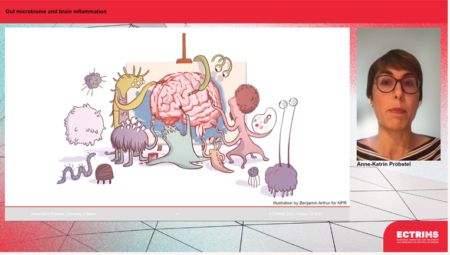
Still Many Unanswered Questions in Secondary Progressive MS (SPMS)
When it comes to Secondary Progressive MS (SPMS) there are many open questions. In the poster section, Poster P001 talks about MRI activity versus relapses as markers of disease activity in SPMS: Data from real-world and pivotal clinical studies. A pivotal clinical trial is a typical Phase III trial done in a very long time to demonstrate or confirm the efficacy and safety of a treatment.
In the mentioned study the objective was to evaluate the contribution of the MRI activity and relapses in defining disease activity in SPMS by analyzing real-world data. It was important to understand if an active SPMS (aSPMS) and a non-active SPMS (naSPMS) are mutually exclusive groups. The base for this study were the Adelphie Real-World MS Disease-Specific Program and the EXPAND Study.
The result: in both studies, the activity in the MRI appears to be a more sensitive measure of disease activity versus relapses. Even after 2 years of no relapse and no MRI activity, the disease activity returned in >50% of previously “non-active” patients on placebo in EXPAND. Also reduced MRI monitoring in naSPMS patients in the real world is a concern that decreases the chance to detect and treat the patients.
Do Lesions in the Brain Help to Predict Long-term Disability?
A presentation called “Cortical lesions at diagnosis predict cognitive impairment in MS: a 20-follow-up study” by Stefano Ziccardi PhD (IT) showed in the Scientific Session 5: IMSCOGS (International MS Cognition Society), that to measure lesions in the cortex (outer covering of the surface of the cerebral hemispheres in the brain) also called: CL’s or cortical lesions, at diagnosis, could predict the long-term risk of cognitive impairment. Data from 170 People living with MS were assessed over 19 years. 41% of the people had no cortical lesions (CL) at the diagnosis. 19% had one or two and 40% had three or more CLs. At the end of the follow-up, 50% of the people with MS met the criteria for cognitive impairment, 25% had mild cognitive impairment, the other 25% had severe impairment.
The analysis showed that patients who probably developed severe cognitive impairment had more substantial lesions when they were diagnosed. It can be concluded that the number of cortical lesions at MS diagnosis accurately discriminates between the presence of the absence of cognitive impairment after 20 years with MS – Ziccardi argued. At last, he added that “this should be considered as a predictive marker of a long-term cognitive impairment”.
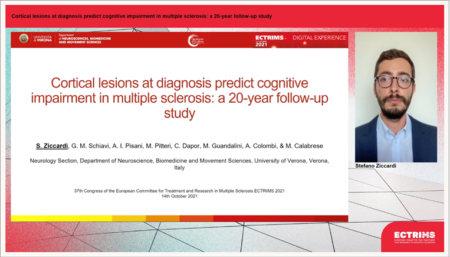
We heard a lot about cognition during the last few days. It is important to train your brain, and people with MS have been doing that for a long time with apps or other tests. A study in Ireland showed that despite the high importance of cognitive care there is very little currently done to address the cognitive challenge faced by people with MS in Ireland. Something similar was mentioned from Prof. Jeremy Hobart in one of the first sessions on Wednesday. There is a big need in more cognitive care but there is no capacity to do it in many countries.
Other summaries
Did you miss the world’s largest meeting dedicated to the understanding and treatment of MS? This year’s digital congress had almost 6,800 participants – but it isn’t too late for you to register for ECTRIMS 2021! Registration will be open until 4 January 2022 at 23:59 CEST. Below we’ve collected some extra summaries of the congress if you’d like to dig deeper into what was discussed during the 3-day congress.
MStranslate is an online science communication initiative from Australia, providing accurate, unbiased, easy to understand information about multiple sclerosis research and news worldwide. Their aim is to remove the complexity of the science to make it easily accessible for every member of the MS community. As every year, they have been covering ECTRIMS live on Twitter and also developed a short summary video covering the latest research outcomes presented during day 3. You can watch their summary and follow their channel here:
ECTRIMS itself has also developed clickable PDF congress reports, where you can quickly navigate and read the summaries of certain sessions within the four topics: Clinical, Pathogenesis, Imaging and Non-Imaging and Biomarkers /Translational Therapy. Check out the official ECTRIMS Congress Report Day 3 – 15 October here!
That’s a Wrap: See You in 2022 in Amsterdam
ECTRIMS 2021 was full of information and a real valuable exchange for all participants. However, there is still a lot to do for all researchers, doctors, and last, but not least, for patients. Because of what we have seen, people living with MS can do a lot to take care of themselves.
We would like to use this opportunity to congratulate the winners of the poster awards Paolo Preziosa, Mattias Bronge, Zoë Yolanthe Germieke, Jocelyn van Lierop, Izanne Roos and Marta Pengo.
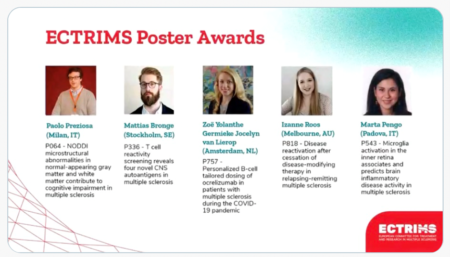
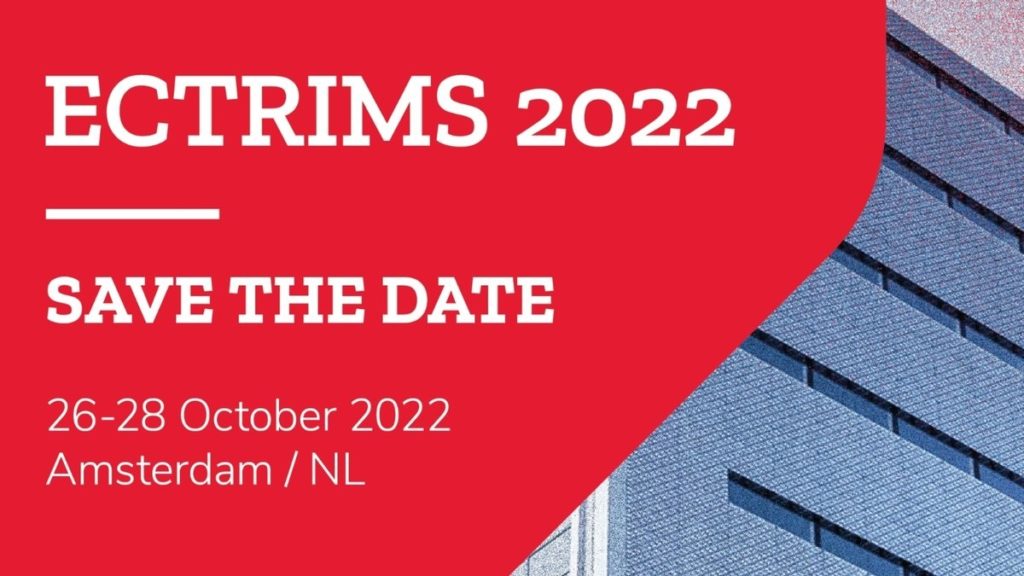
We also extend our congratulations to the organizer for a successful event and we would like to extend our gratitude to the Board of ECRIMS for providing 10 free passes for the European MS patient community. We are looking forward to next year, when ECTRIMS2022 will hopefully take place in Amsterdam on October 26 – 28.
CME Accreditation and Certificate of Attendance
You may earn up to 12 CME credits at ECTRIMS 2021. CME credits are automatically awarded if you have watched at least 50% of an accredited session and have completed the session evaluation. Register until 4 January 2022 to benefit from the CME credits.
 Your Account
Your Account